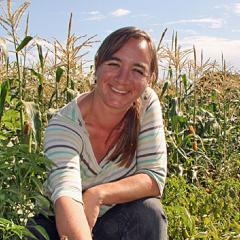A unique approach to sustainable agriculture
Editor's Note: This profile was originally published on the UC Davis College of Agricultural and Environmental Sciences website. It has been edited slightly to focus on Ildi's work.
Ildi Carlisle-Cummins traces her love of food to the afternoons and evenings of her youth helping her father prepare meals. But it was a study abroad trip to Costa Rica in 2001 that brought her interest in food and agriculture into sharper focus.
“I was sitting in a chicken barn on an organic farm listening to a lecture about compost when my class received the news about the terrorist attacks on 9/11,” she said. “Trying to make sense of what had just happened, I looked hard for positive ways to make the world a better place. In a world that suddenly seemed much harsher, I saw organic and sustainable farms as living laboratories where people were solving practical problems that improved the environment while addressing the most basic social injustices.”
In 2003 she earned her Bachelor of Science degree from the University of Michigan in her self-designed degree, combining ecology and social science with a focus on sustainable agriculture. Over the course of the next 10 years she worked on the front lines of the community food systems movement. She ran a nutrition education campaign at a community resource center, compiled a food security guide for a local food bank, and chaired the board of Life Lab Science Program, a Santa Cruz, Calif., nonprofit specializing in farm- and garden-based education.
In 2005, Carlisle-Cummins went to work for the Community Alliance with Family Farmers to run the Farm-to-School Program. “I put my whole heart and mind into building a program that could share my love of sustainably produced food with elementary school children,” she said.
In addition to getting locally grown produce into school cafeterias across Northern California, she also brought farmers into the classroom and school children out for farm visits to increase youngsters’ agricultural literacy. “Children rarely learn about agriculture in schools,” she says. “I knew if I could get fifth-graders to be excited about rutabagas, I knew I could get other people thinking about food issues.”
Before long she was making the case for sustainable agriculture in front of local and statewide audiences and giving media interviews to the likes of National Public Radio. “I was honored to be recognized for my expertise in farm-to-school programs in California and was called upon to share my knowledge with a wide variety of audiences—from medical societies to philanthropic groups to farming conferences and school boards,” she said.
Still, something was missing. “I often felt that I was ‘winging it’ without the depth of understanding of the history of the food system that I would have liked,” she said.
In a program sponsored by the Santa Cruz County Farm Bureau, she learned about the unique history of California’s Pajaro Valley and how the Croatian families who settled there started apple and produce businesses that carved up the region into smaller parcels of land that distinguish it from farms in the Salinas or Central valleys. “I was inspired to head back to school to keep learning about the development of California agriculture,” she said.
She entered UC Davis as a graduate student working toward her master’s degree in community and regional development in fall 2011, intent on studying California’s agricultural past and present. In her first quarter she discovered a large body of academic research on community food systems and is starting a graduate-student working group focused on food systems.
David Campbell, a Cooperative Extension specialist in the Department of Human and Community Development, is Carlisle-Cummins’ faculty adviser. He’s been impressed with her quick grasp of new knowledge and her ability to make points of connection between theory and practice. Her academic work examines the complex ways in which conventional and alternative food systems are interconnected and mutually transforming, leading not only to conflict but to bridge-building possibilities.
“She’s an outstanding listener who quickly reads new situations,” Campbell said. “Her organizing skills were evident from the first day she landed in our community development program. The Switzer Fellowship is a well-deserved opportunity for her to explore leadership opportunities on a larger stage.”
Jan Hopmans, associate dean in the UC Davis College of Agricultural and Environmental Sciences, is impressed with Carlisle-Cummins’ unique approach—learning about California’s agricultural past to seek out success stories offering solutions for intensive agricultural food systems that minimize impacts on the surrounding ecosystems and natural resources. “This is yet another fine example of why students are seeking out our college, campus, and land-grant university, and commit in contributing to a better society,” Hopmans said.
Carlisle-Cummins is the latest UC Davis graduate student to be awarded a fellowship from the Robert and Patricia Switzer Foundation. She joins five other UC Davis graduate students who have been awarded one of the prestigious fellowships within the last three years: Mark Elbroch (ecology), Tavis Forrester (ecology), Karrigan Bork (ecology), Kathy Deiner (ecology), and Matthew Hamilton (international agricultural development).
Carlisle-Cummins also plans to simultaneously complete a professional concentration in conflict resolution at UC Davis to build facilitation and leadership skills. “With a master’s degree I intend to jump back into the field with new direction and informed opinions about where the sustainable agriculture movement should go next,” she says. “And, of course, I will continue to savor every bite.”
CONTACTS:
John Stumbos, senior writer, UC Davis College of Agricultural and Environmental Sciences, (530) 754-4979, jdstumbos@ucdavis.edu.
